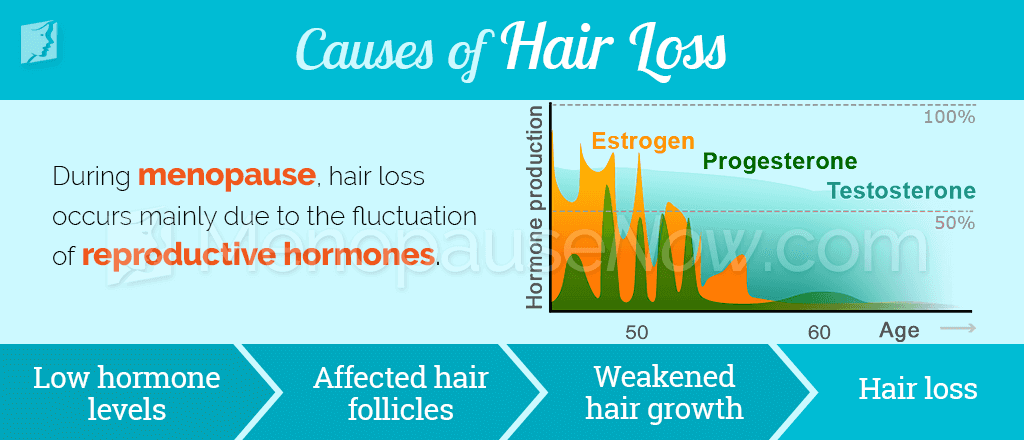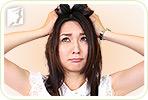Did You Know?
Women of European descent are far more likely to experience hair loss during menopause than Native Americans, Asians, or Africans.
Hair loss can be caused by a number of potential factors and is often a combination of more than one. For women in menopause, the cause is fundamentally hormonal, though stress and anxiety - which are also hallmarks of this stage - can certainly have an effect as well. Diet also plays a large role in hair loss. Read below to learn more about the various causes of hair loss, not only hormonal, but medical, behavioral, and psychological as well.
Hormonal Causes of Hair Loss
Hair loss during menopause is often due to fluctuating hormone levels. Two main hormones are involved in hair growth: estrogen and androgen.
In estrogenic alopecia, hair loss is directly attributed to decreased estrogen levels. Estrogen helps hair grow faster and stay on the head for a longer duration, leading to thicker, healthier hair. In some instances, women often have fuller, thicker hair during pregnancy due to increased estrogen levels. By contrast, during menopause, estrogen levels decline, leading to a thinning of hair.
Estrogen is not the only hormone that carries the potential to cause hair loss in women approaching menopause. Androgens - of which testosterone is one - tend to increase as estrogen levels decrease during menopause. This causes androgenic alopecia, another form of hair loss. An androgen known as dihydrotestosterone (DHT) appears to bind to hair follicles and force them to go into their "resting" phase, or telogen, sooner than is normal. This means that the new hairs grow thinner with each cycle of hair growth. Testosterone also shrinks the hair follicles, causing hair loss on the head, yet a greater production of facial hair.
Not only do hormonal imbalances lead to hair loss during menopause, but other factors can also be to blame. Keep reading to learn more about other medical, psychological, and behavioral causes.

Other Causes of Hair Loss
While the causes of hair loss are primarily hormone induced for women, there are many other factors that may also play a role in hair loss during menopause.
Medical
- Pregnancy
- Thyroid disorders
- Anemia
- Chemotherapy
- Chronic illness
- Scarlet fever
Psychological
- Anxiety
- Emotional stress
- Traumatic events
- Eating disorders
Lifestyle-related
- Excess vitamin A
- Lack of vitamin D
- Iron deficiency
- Lack of protein
- Lack of exercise
- Pulling or twisting hair
While hair loss can be emotionally trying, it doesn't necessarily have to be permanent. Now, with a clear understanding of the primary causes of hair loss during menopause, click on the following link to begin learning about the various treatments for hair loss.
Sources
- National Health Service UK. (2015). Women and hair loss: coping tips. Retrieved April 14, 2016, from http://www.nhs.uk/livewell/hairloss/pages/womenandhairloss.aspx
- National Institutes of Health. (2014). Female pattern baldness: MedlinePlus Medical Encyclopedia. Retrieved April 14, 2016, from http://www.nlm.nih.gov/medlineplus/ency/article/001173.htm
- National Institutes of Health. (2014). Hypervitaminosis A. Retrieved April 14, 2016, from https://www.nlm.nih.gov/medlineplus/ency/article/000350.htm
- Park, S.Y. et al. (2013). Iron plays a certain role in patterned hair loss. Journal of Korean medical science, 28(6), 934-938. doi: 10.3346/jkms.2013.28.6.934
- Rasheed, H. et al. (2013). Serum ferritin and vitamin D in female hair loss: do they play a role? Skin pharmacology and physiology, 26(2), 101-107. doi: 10.1159/000346698
- Riedel-Baima, B. & Riedel, A. (2008). Female pattern baldness may be triggered by low oestrogen to androgen ratio. Endocrine regulations, 42(1), 13-16. Retrieved from http://www.ncbi.nlm.nih.gov/pubmed/18333699



